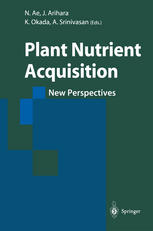

Most ebook files are in PDF format, so you can easily read them using various software such as Foxit Reader or directly on the Google Chrome browser.
Some ebook files are released by publishers in other formats such as .awz, .mobi, .epub, .fb2, etc. You may need to install specific software to read these formats on mobile/PC, such as Calibre.
Please read the tutorial at this link: https://ebookbell.com/faq
We offer FREE conversion to the popular formats you request; however, this may take some time. Therefore, right after payment, please email us, and we will try to provide the service as quickly as possible.
For some exceptional file formats or broken links (if any), please refrain from opening any disputes. Instead, email us first, and we will try to assist within a maximum of 6 hours.
EbookBell Team

4.8
94 reviewsNew research reveals that plants actively acquire nutrients; the acquisition process is not a passive one in which plants simply wait for dissolved nutrients to come closer to their roots. In fact plants play a far more active role than once was understood to be possible in nutrient acquisition and in adaptation to problem soils. This book presents an excellent overview and summary of new concepts of plant nutrient acquisition mechanisms, and sets forth their practical implications in crop production. The scope is wide ranging, from biochemical, molecular, and genetic analysis of nutrient acquisition to global nutritional problems. Especially noteworthy are the sections on the cell apoplast, phosphorus-solubilizing organisms, and direct uptake of macro-organic molecules. With contributions by leading scientists worldwide, the book provides an invaluable resource for researchers in plant and environmental sciences and in agronomy and other branches of agriculture.